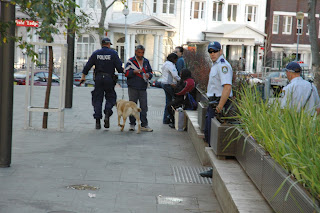 |
Police in Kings Cross guide a sniffer dog towards
an indigenous man in one of their daily street trawls.
No drug indication was made. |
Following the killing of George Floyd by police in Minneapolis, mass protests in the western world have all but pushed Covid 19 off the front pages (not that there are too many of those left!). "Black lives matter" is again an anthem.
But the endless discussion around the problem of over-policing people of colour, while exploring the complexities of history and culture, almost always ignores one central driver – the entirely pointless and ineffective War on Drugs. And if you don't agree that 'war' is pointless, you need to explain the success of
Portugal's blanket decriminalisation of illicit drugs.
Meanwhile most American states, and Australia where drug sniffer dogs roam the streets, continue to criminalise the use of drugs other than alcohol. In Australia, drug and alcohol "abuse"* is one of the four key risk-factors for involvement in the criminal justice system
according to a Parliamentary report.
Available data shows that Indigenous Australians fair (sic) significantly worse than non-Indigenous Australians in regard to these four critical factors which influence involvement in crime.[7] These factors have interrelated detrimental impacts and can be seen as forming a vicious cycle
The Guardian found there had been at least 434 deaths in custody since the Royal Commission into Aboriginal Deaths in Custody ended in 1991 – that's more than one per month.
In 2018–19 Australia recorded 77,074 illicit drug offences, 20% of the total (ABS). It's not simplistic to suggest that the decriminalisation or legalisation of drugs would significantly reduce the criminalisation of Indigenous people – with the stroke of a pen, as it were. Understandable fears by many people that such a move would create a "flood of stoners wandering around the streets", as is often claimed by prohibitionists, simply does not happen for reasons beyond the scope of this article.
So I urge those who campaign in the 'Black lives matter' space to join the dots between racially skewed policing and the War on Drugs. You may see them as separate issues but the dots do join very strongly.
* I place the word "abuse" in quotes here because crime statisticians tend to class any drug use as "abuse" even though the vast, vast majority of such drug use causes no significant problems for the user or others. I see the inaccurate terminology as part of the demonisation of drugs carried out by the forces of prohibition, not least to reinforce their own survival as a well funded industry.
 |
| US prison statistics illustrate the huge impact prohibition has on the criminal justice system. |




